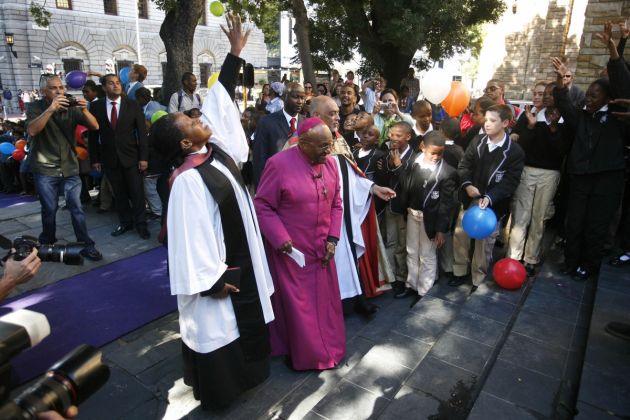Tutu joins UN rights chief in support of LGBT community

Archbishop Emeritus Desmond Tutu and Nobel Peace Prize laureate has said he does not support a homophobic God.
"I would refuse to go to a homophobic heaven. No, I'd say sorry. I mean, I'd much rather go to that other place," he told reporters in Cape Town.
"We have to build a society that is accepting and it is not a free society until every single person knows they are acknowledged and accepted for who they are."
Tutu joined with the Office of the United Nations High Commissioner for Human Rights on Friday in the launch of Free & Equal, an unprecedented global public education campaign for lesbian, gay, bisexual and transgender (LGBT) equality.
At a press conference held in Cape Town, South Africa, UN High Commissioner for Human Rights Navi Pillay was joined by Tutu and Justice Edwin Cameron of the South African Constitutional Court to announce the year-long project.
A statement of support was read out on behalf of renowned South African singer and UNICEF and Roll Back Malaria Goodwill Ambassador Yvonne Chaka Chaka.
"The Universal Declaration of Human Rights promises a world in which everyone is born free and equal in dignity and rights – no exceptions, no-one left behind," said Pillay, who is a former South African judge.
"Yet it's still a hollow promise for many millions of LGBT people forced to confront hatred, intolerance, violence and discrimination on a daily basis."
Pilllay said, "But we know from experience that eradicating discrimination requires more than changes in laws and policies. It takes a change in people's hearts and minds as well.
"I was reminded of this truth when reading about the recent spate of appalling, brutal murders of lesbians here in South Africa – part of a longer term pattern.
"South Africa has some of the best laws in the world when it comes to protecting the rights of gay and lesbian people but it also has some of the worst cases of homophobic violence. People are literally paying for their love with their lives."
The U.N. campaign aims to raise awareness about homophobic violence and discrimination. Tutu said many people felt they could not be comfortable in their skin because of potential ridicule.
The former Anglican archbishop of Cape Town said he was aware that many religious leaders promoted the idea that it was a sin to be anything but heterosexual.
"There is deep anguish for many of us that they can imagine that God would create someone and put them there and say 'I hate you. I hate you for who I made you to be'."
Tutu said South Africa should reject discrimination against sexual orientation, as it had done with racism.
"Can you imagine me having said it's unjust to penalise something they cannot do anything about, their race or gender, and then to keep quiet when people are hounded, people are killed, because of their sexual orientation?" he asked.
"I think it's as utterly unjust as racism ever was."
Tutu said non-heterosexuals were often described as being a "particular breed."
"They are not a peculiar breed. That is precisely what we are saying, that they are human beings. I don't know why we are so surprised. They have gifts, they can become judges. They can become all sorts of wonderful things."